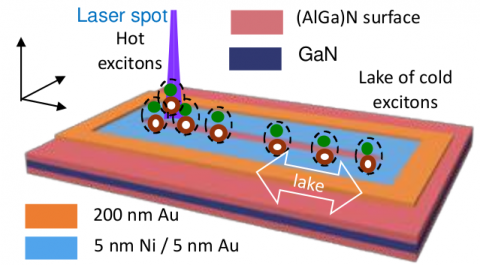CSTCP seminar: "Dipolar exciton fluids in GaN/(AlGa)N nanostructures" - M. Vladimirova
Event typology:
home
Seminars
Dipolar exciton fluids in GaN/(AlGa)N nanostructures
M. Vladimirova
(Université de Montpellier, France)
Thursday 19/05/2022 at 18:00
Live streaming on Zoom: https://zoom.us/j/92271446912?pwd=b21pZWlxcDQ1Qmp5ajBGbjgzaXJ4dz09
Meeting ID: 922 7144 6912
Passcode: 302458
Dipolar, or indirect excitons (IXs) offer a rich playground for both design of novel optoelectronic devices and fundamental many-body physics. Wide GaN/(AlGa)N quantum wells host a new and promising realization of such excitons. Indeed, compared to their counterparts in GaAs-based heterostructures, IXs in nitrides possess two key advantages. They have higher binding energies, and they are “naturally” indirect. This means, that they can be engineered and manipulated in as-grown heterostructures, even without application of an external electric bias [1, 2]. In this work we demonstrate (i) the propagation of IXs over hundreds of micrometers in the plane of GaN/(AlGa)N quantum wells, (ii) confinement and cooling of these excitons, when trapped in the electrostatic potential created by semitransparent electrodes of various shapes deposited on the sample surface (iii) the electrical control of the IX fluxes via an applied gate voltage [3]. Once confined, the exciton fluid accumulates in uniform zones. By modeling the emission spectra of these zones, we get insight into the thermodynamic properties of the thermalized exciton fluid. These results constitute a prerequisite for realization of the GaN-based excitonic devices, as well for studies of the complex phase diagram of these dipolar bosons at low temperature.
[1] F. Fedichkin et al, Phys. Rev. Applied, 6, 014011 (2016).
[2] F. Chiaruttini et al, Nanolett. 19, 4911 (2019).
[3] R. Aristegui et al, arXiv:2203.13761 (2022)
Venue:
Even though being on-line with the speaker as well on-line, the interested people can follow it from Room D at ICTP in Miramare, in front of the Euler Room.
Information:
The Colloquium Series in Theoretical and Computational Physics targets the whole physicists community, physics students at all levels are particularly welcomed to attend.
The colloquium will last 45 minutes, followed by 15 minutes of discussion.
Contacts:
Andrea Trombettoni (atrombettoni@units.i)
Last update: 05-17-2022 - 21:27



